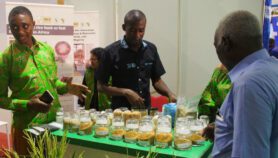By: Joshua Howgego
Send to a friend
The details you provide on this page will not be used to send unsolicited email, and will not be sold to a 3rd party. See privacy policy.
[GENEVA] The UN Conference on Trade and Development (UNCTAD) is to launch a project to help build policymakers’ capacity to implement science and innovation fostering plans in developing countries.
The move was prompted by the agency recognising that many developing countries were struggling to implement the recommendations it issues as part of its reviews of nations’ science, technology and innovation policies.
It has conducted six of these — in countries including the Dominican Republic, El Salvador and Ghana — since 2010. It says this implementation problem is “fairly widespread”.
The main reason is that government officials outside countries’ science ministries often fail to see the value in developing innovation policies when confronted with other, more pressing problems, according to Angel González Sanz, the chief of UNCTAD’s science, technology and ICT (information and communications technology) policy review section.
“It’s been a challenge to mobilise interest among these people,” he says. “But as a body that typically engages with high-level politicians on economic matters, we think we’re well placed to get leverage on this issue.”
“Economic knowledge about what works can’t be transferred automatically to the new setting. It has to be generated in the country.”
Dominique Foray, Swiss Federal Institute of Technology
UNCTAD’s plan has two prongs. The first is to develop training materials for policymakers that explain best practice in designing and executing innovation plans. The second is to create a network of experts and institutions that can help develop training tools on an ongoing basis.
The project has secured funding to run for one year from the UN Development Fund. But beyond that its future is uncertain, says González Sanz. “These things tend to get funded for a short period,” he says. He notes that the agreed funding will pay for the training materials, which UNCTAD will then be able to use regardless of whether the project continues in the long term.
González Sanz says his agency has “pretty clear ideas” about what its training materials will include, but it is also checking these with experts. For instance, he says, the materials are likely to include guidance on what innovation really is, since stakeholders often understand the term to mean different things. It will also probably cover the management of intellectual property and best practice in technology transfer, he says.
UNCTAD hosted an expert meeting in Geneva, Switzerland, recently (19-21 March) where it unveiled the project and asked delegates for their input on it.
Dominique Foray, who studies innovation management at the Swiss Federal Institute of Technology in Lausanne, told the meeting that, when technology transfer plans are unsuccessful, it is often because of a failure to consider the economic and social factors in the new location.
“Economic knowledge about what works can’t be transferred automatically to the new setting. It has to be generated in the country,” he said.
Foray said that one way of enabling this is to set up centres to advise entrepreneurs on issues such as intellectual property rights while they adapt technologies to their setting. The Swiss government has funded several such centres in the developing world, focused on more sustainable industrial production and processing, he said, with the first of these ‘cleaner production centers’ launched in Colombia in 1998.
González Sanz tells SciDev.Net that making policymakers aware of such complexities is important and should be included in the training UNCTAD plans to develop. He says he expects the materials to be ready by mid-2015.
Several other existing UN projects are broadly designed to boost nations’ capacity to create effective innovation policies. Two such projects, GO→SPIN (Global Observatory of Science, Technology and Innovation Policy Instruments) and STIGAP (the Science, Technology and Innovation Global Assessment Programme), organised by UNESCO (the UN Educational, Scientific and Cultural Organization), have suffered from a lack of funding.
Guillermo Lemarchand, a science policy consultant at UNESCO, tells SciDev.Net that in 2011 his agency launched an African branch of GO→SPIN to collect data on innovation policy instruments such as tax incentives and public procurement initiatives.
But funding for a web platform to host the information was cut due to the global financial crisis. He says that SIDA (the Swedish International Development Cooperation Agency) is likely to provide funding this year to complete the platform.














